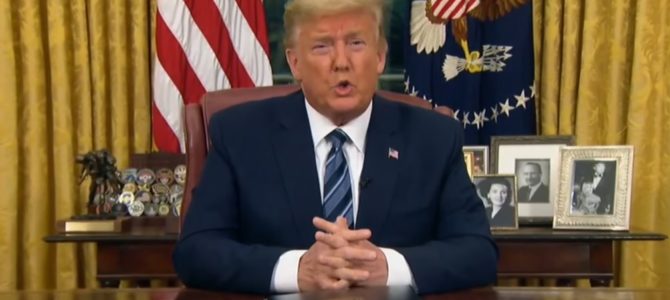President Donald Trump struck a different tone in his prime time address to the nation Wednesday night announcing new measures to combat the Wuhan virus pandemic, and urging Americans to heed the advice of public health officials to halt the spread. Calm, cool, collected, yet urgent, Trump’s Oval Office remarks were an illustration in the kind of presidential leadership Americans crave in moments of crisis.
Rather than downplaying the threat that the Wuhan virus presents, the president confronted the scale of the pandemic and acknowledged the challenges ahead while reassuring the American people that the nation would emerge with minimal harm despite a sinking stock market.
“We are marshalling the full power of the federal government and the private sector to protect the American people,” Trump said. “This is not a financial crisis, this is just a temporary moment of time that we will overcome as a nation and as a world.”
Americans look to the nation’s presidents in times of disaster and crises to provide comfort and leadership. In 2001, President George W. Bush united the country in the wake of the terrorist attacks on 9/11 that left nearly 3,000 Americans dead. Fifteen years earlier, President Ronald Reagan was tasked with the same following the explosion of the NASA Challenger space shuttle. Speaking on Jan. 28, Reagan lifted the nation with words of hope and optimism, drawing parallel comparisons with historical heroes whose bravery paved the way for modern society.
“There’s a coincidence today,” Reagan explained in an Oval office address. “On this day 390 years ago, the great explorer Sir Francis Drake died aboard ship off the coast of Panama. In his lifetime the great frontiers were the oceans, and an historian later said, ‘He lived by the sea, died on it, and was buried in it.’ Well, today we can say of the Challenger crew: Their dedication was, like Drake’s, complete.”
The Wuhan virus is Trump’s big test to calm an anxious country worried about the pandemic confronting them. According to the latest numbers at the time of this writing, nearly 130,000 people worldwide have been infected and nearly 5,000 have died. In the United States, more than 1,300 have contracted the virus with 30 fatalities. Public health experts believe the infection rate in the U.S. is far higher due to lack of testing.
Now the world is scrambling to contain the outbreak. On Wednesday afternoon, the World Health Organization officially declared the threat over the Wuhan coronavirus a “global pandemic.” The entire nation of Italy is on lockdown, schools around the world have closed, major events across the globe have been cancelled or postponed, and stock markets are crashing.
Trump’s prime time remarks showcased a sharp change in tone from the president far different than in recent weeks discounting the severity of the outbreak. In a few minutes, Trump laid out a series of proposals and exective orders that would be implemented to stop the spread of the virus and provide relief to individuals and businesses impacted, the most major of which features a near-total ban on European travel with an exception made for the United Kingdom. The president also instructed Americans to stay home if sick and to take the necessarily precautions to avoid infection, including a request that nursing homes halt any non-medically necessary visits as older Americans are most susceptible to the worst of the virus.
“Smart action today will prevent the spread of the virus tomorrow,” Trump said.
Now is the time for the president more than ever to stay on message acknowledging the scale of the health and economic crisis while working to ease public panic.









